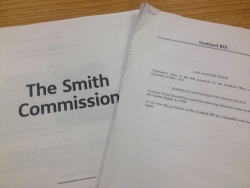
Whilst there are a number of areas of the Scotland Bill that fully meet the word and spirit of the Smith Agreement, Citizens Advice Scotland (CAS) believes that, as currently drafted, there are a number of sections of the Bill relating to social security and tribunals that do not appear to meet its intent. CAS is concerned that without changes being made there are clear risks of detriment to CAB clients, who sought advice on 207,875 new benefits issues in 2013/14 and who have been subject to recent changes to reserved tribunals which have had a marked and detrimental effect on consumers in Scotland.
Summary
Citizens Advice Scotland recommends:
-
The Bill is amended to include provision for the Scottish Parliament to create new benefits in areas that are not reserved.
-
Clause 19 should be amended to ensure that all disabled people are covered by the definition and eligible for support from devolved disability benefits.
-
Clause 19 should be amended to remove restrictions on paying carers benefits to all carers, including those who are under 16, in full-time education or in employment.
-
Clause 23 is amended to remove unnecessary restrictions that may limit the Scottish Parliament’s current ability to make Scottish Welfare Fund payments to individuals subject to a benefit sanction.
-
Clauses 24 and 25 are amended to remove the requirement for the Scottish Government to secure the Secretary of State’s agreement before using devolved administrative powers over Universal Credit.
-
Clause 26 is amended to ensure all employment programmes are devolved, including those lasting less than a year, and the Access To Work scheme.
-
The Bill is amended to incorporate the alternative clause 33 proposed by the Scottish Government ensuring all powers over the management and operation of all reserved tribunals will be devolved to the Scottish Parliament.
-
Reserved tribunals identified by the Smith Commission should be fully devolved with no residual control retained by Westminster
- Jurisdictional issues about the definition of a ‘Scottish case’ must be resolved